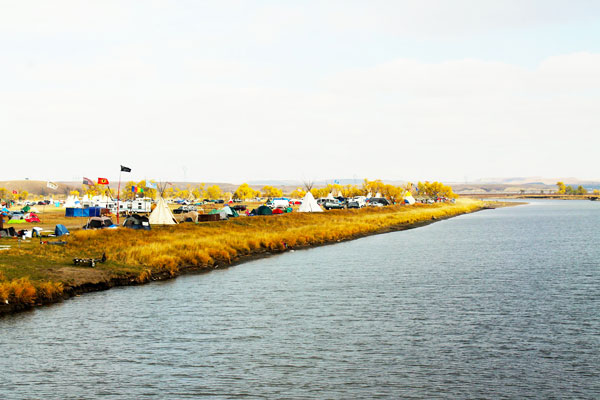For four days over fall break, a group of Goshen College students travelled to Standing Rock Sioux Reservation. Seniors Sarah Hofkamp, and Anya Slabaugh, juniors Chelsea Risser, Kenan Bitikofer, Benjamin Wiebe, Deeksha Pagar, and Hannah Yoder, and sophomore Christi Sessa were able to make the trip with the sponsorship of GC’s Social Reform Club and additional funding from Student Senate.
Since early April, thousands of Native Americans and allies have set up camp along the Missouri River in Cannon Ball, North Dakota to protest the Dakota Access Pipeline, or DAPL. The pipeline route will cross underneath the Missouri River just upstream of the reservation and potential leaks could threaten drinking the water sources of 17 million people downstream.The GC students stayed at Oceti Sakowin camp, the largest of the four NoDAPL camps located along the northern border of the reservation. Each person found opportunities volunteering in the kitchen, organizing clothing donations, serving meals, constructing tipis and washing dishes.
Recently, national media began to cover the DAPL opposition, following incidents of military-style assault by police and national guard on the nonviolent protesters known as water protectors. However, behind these front-line confrontations are camps that sustain several schools, kitchens, a direct action training center, an activist art station, a Two Spirit camp and many other community-building initiatives.
Bitikofer, a junior computer science and music double-major, reflected that in the camp “everything was provided freely and generously,” in an environment free of hierarchy.
Community is formed in the camp between water protectors from different tribes, backgrounds and perspectives. Representatives of over 200 indigenous tribes from areas throughout Turtle Island, also known as the Americas, have joined the anti-DAPL movement at Standing Rock.
Nearly a mile of road is lined with flags representing each tribal nation that opposes DAPL. Some root their opposition in a message of environmental protection while many others speak through the lens of indigenous rights.
The students found more than just a political and environmental campaign. The camps are widely recognized as one of the largest spiritual gatherings of indigenous peoples ever. Everything at the camp, from building a fire to picking up trash, is done in prayer.
Each morning at Oceti Sakowin camp, sunrise is marked with a women’s water ceremony along the banks of the Cannon Ball River.
“I loved the morning rituals,” reflected Pagar, a junior physics and biochemistry double major. “I don’t normally sing, but I wanted to pray with them and that was more important than my embarrassment. The songs were amazing.”
Everyone was welcome to participate in these ceremonies led by native women. Rituals involved unique collaborative roles for women, men and Two Spirit people. The words Mni Wiconi, the Lakota phrase for water is life, were spoken and shouted as government surveillance planes circled overhead.
Although the students only spent several days in Standing Rock, they formed personal relationships with the community and landscape.
“When I hear the news about increasing violence,” Bitikofer said, “I can imagine the people that I met and think about their safety.”
Pagar recalls one particular conversation with Ashton, a 12-year-old who told her “since the moment you entered here, we were family.”
Just last week, indigenous water protectors cited century-old violations of the Fort Laramie Treaty of 1851 and established a new front line camp directly along the pipeline’s projected route. In a matter of days, law enforcement officers from seven states, including Indiana, were summoned to break up the camp.
Water protectors were attacked with batons, mace, rubber bullets, beanbag rounds, stun guns and an LRAD sonic weapon. In total, over 140 protesters were arrested, prompting increasing international outrage.
On campus, Goshen College students have organized a series of events to engage the anti-DAPL movement. Students, faculty and staff are invited to call and email the political and corporate leaders instrumental in the approval and construction of the Dakota Access Pipeline.
Resources and scripts will be provided in Java Junction from 9:00 a.m. to 1:00 p.m. on Thursday, Nov. 3 and Monday, Nov. 7. Weekly prayer vigils will be held Wednesday from 10:45 a.m. to 10:55 a.m. in the Newcomer courtyard.


